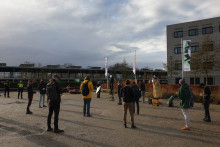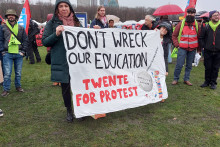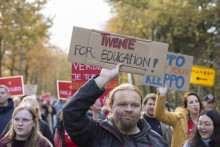On the O&O-square, about twenty students are ready for the University Rebellion gathering. Circles have been scratched into the gravel to ensure a safe distance. All attendees are wearing face masks. Two policemen are watching from a distance. One of the students, dressed in a colorful toga, takes the floor. He addresses the audience about the demands of University Rebellion.
The students demand direct climate action, such as a CO2-neutral university in 2025, as well as a decolonized and democratized university, where diversity and equality are paramount. While the young student tells his story, a symbolic scene takes place in the background. The link between the UT and Shell, portrayed by two students connected by a rope, is literally cut.
The students of the protest movement University Rebellion are calling for action on climate change at twelve universities today, says UT master's student and activist Jonny Grünsch. ‘We are doing it together, because we think the system needs to change. It's not just about the UT. With University Rebellion we want to build a community, because as an individual it is difficult and intimidating to take action.’
The movement is linked to Extinction Rebellion, but according to Grünsch there are also differences. ‘In addition to climate change, we call for attention to decolonization and democracy at the university. University Rebellion wants to combat global inequality, hence the term decolonization'. According to Grünsch, the intentions of university lecturers and researchers are generally good. ‘I notice this during my lectures. But we hardly see any actual change. That is why we are now making these strong demands on the university.’

(Photo: Rector Thom Palstra talks with the students of University Rebellion aftherwards)
Praiseworthy
After the speech, Rector Thom Palstra receives the manifesto. ‘I think this action is praiseworthy', he responds. ‘These are very important themes. What's more, they don't just refer to the climate, but also to social sustainability. That is good to hear. The themes are also essential parts of our strategy as a university.’ Palstra wants to look at the demands 'in detail'. ‘I think the students primarily want to put something on the agenda. That's the most important now.’
The symbolic scene, in which the link between the UT and Shell is cut, is perceived by the rector with 'mixed feelings'. ‘I am a former employee of Shell. Nevertheless, it is shocking to see how oil companies have downplayed the debate on climate change. I share the students' view on that. At the same time, these oil companies have become system players. Just think of the chemical and pharmaceutical industries. I don't know whether, as a university, you have to break all ties with these companies.’
Above all, Palstra does not want to create too many divisions. ‘I prefer not to be antagonistic: in my opinion, we need to solve the climate crisis together. That is the quickest way. The university certainly has a leading role, but at the end of the day we have to do it with society as a whole.’ The Rector is going to discuss the manifesto with the rest of the board. ‘It is important enough for us, as the entire Executive Board, to focus on this directly.’
The students are hoping for a quick change. ‘University Rebellion has only just started. We will give the Executive Board time to read our manifesto. But if there is no change, we will soon have new actions on campus.’






